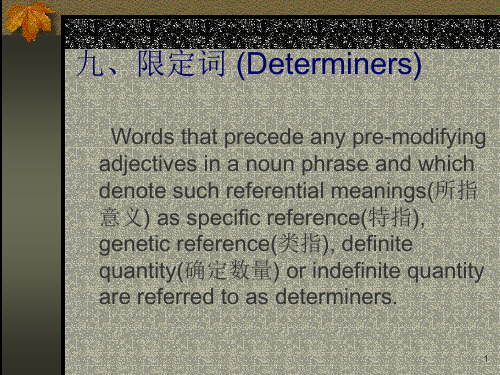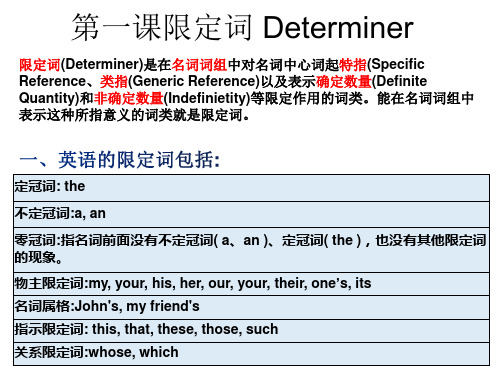大学英语专业语法课件3——限定词Determiner
- 格式:ppt
- 大小:186.00 KB
- 文档页数:44






限定词(determiner)限定词的先后顺序:前位---中位---后位(一个名词中心词之前不可并用两个前位限定词或两个中位限定词)冠词的表意功能冠词在各类名词之前的用法(参见P76)(1)The ten of them have passed the final examination.Ten of them have passed the final examination.Ten of the (these/his) students have passed the final examination.(2)They asked to stop counting presidential votes for a second time.(3)Every boy and every girl___(have) his merits.Every young man, young lady,and child ___(be) requested to take part.Many a person___(be) going to the take the test.(4)Other or anotherCalifornia covers a large area than __________state except Alaska and Texas.Out of the three foreign guests, one is from Frankfurt, ______two are from Vienna.Don't lose heart. Have ___try.There's room for _________people in the back of the bus.National Day is coming. We'll have _____ five-day holiday.(5)冠词的用法Who is ___captain of your team?Mr. Reagan was elected ___President of the United States in 1980.Charles Dickens,__author of David Copperfield, was a distinguished English novelist.As ____physician, he does not deserve much praise.He was covered with snow from ___head to __foot.The relation between ___teacher and ___student is excellent.This room serves the triple purpose of ___study, ___bedroom and ____sitting room. The old man was sitting in a chair, ___pipe in ___hand.He sat at ___ table, ___coat off, ___head down, and __pen in ___hand.What kind of ___man is he?What sort of ___book do you want?The work is ____pleasure to me.She has developed ___love for labour.Physics is ____ science.He spoke with _____ enthusiasm which inspired us all.Do you like ___ music of ___film?Phonetics is ____science of speech sounds。
determiner语法Determiner是英语中一类特殊的词类,用于限定名词的意义。
它们通常出现在名词前面,帮助我们确定名词的数量、身份、所属关系等。
在英语语法中,Determiner起到非常重要的作用,因为它们可以改变名词的含义,甚至改变整个句子的意思。
本文将详细介绍Determiner的语法和使用方法。
一、Determiner的种类1. 冠词(Articles): 冠词分为不定冠词(a、an)和定冠词(the)。
不定冠词用于表示泛指或未知的名词,而定冠词用于特指已知的名词。
例句:- I saw a cat in the garden.(我在花园里看到了一只猫。
)- The cat is black.(那只猫是黑色的。
)2. 限定词(Demonstratives): 限定词用于指示名词的位置或身份。
常见的限定词有this、that、these、those等。
例句:- This book is interesting.(这本书很有趣。
)- Those apples are delicious.(那些苹果很好吃。
)3. 指示代词(Pronouns): 指示代词用于代替特定的名词,表示其位置或身份。
常见的指示代词有this、that、these、those等。
例句:- I want this one.(我要这个。
)- That is mine.(那是我的。
)4. 代词(Possessives): 代词用于表示所属关系。
常见的代词有my、your、his、her、its、our、their等。
例句:- This is my car.(这是我的车。
)- Is this your book?(这是你的书吗?)5. 数词(Numbers): 数词用于表示数量。
常见的数词有one、two、three等。
例句:- I have three dogs.(我有三只狗。
)- Two birds are flying in the sky.(两只鸟在天空中飞翔。
Lecture 3 determinersWords that precede any pre-modifying (前置修饰) adjectives in a noun phrase and which denote such referential meanings (所指意义) as specific reference (特指), generic reference (类指), definite quantity (确定数量) or indefinite quantity (非确定数量) are referred to as determiners.Determiners are used to determine nouns in numbers and areas. Determiners include articles, numerials, possessive pronouns, demonstrative pronouns, and indefinite pronouns. The head of a noun phrase limits the choice of derterminers, and when more than one determiner occurs in the noun phrase, there is the problem of word order.3.1 classification of determiners1) According to their potential position, determiners fall into three subclasses: pre-determiners (前置限定词), central-determiners (中置限定词) and post-determiners (后置限定词).2) Pre-determiners are those that precede central-determiners and post-determiners. Pre-determiners are also mutually exclusive. They include: all, both, half, double, twice, three times, etc.; one-third, two-fifths, etc.; such, what.3) Central-determiners include: articles, possessive pronouns, demonstrative pronouns, gentitive nouns, some, any, no, every, each, neither, either, what, whatever, which, whichever, whose, whosever, enough, etc. Note that central-determiners are mutually exclusive and that no two members of the above-cited items ever occur together in a noun phrase.4) Post-determiners refer to those that follow central or pre-determiners. Post-determiners are not mutually exclusive, that is to say, two or more such items can co-occur in a noun phrase. This subclass includes: cardinal numerials, ordinal numerials, next, last, other, another, many, few, much, little, more, most, fewer, fewest, less, least, several, such, plenty of, a lot of, lots of, a great [large, good] number of, a great [good] deal of, a large [small] amont of.5) When a noun phrase contains all three subclasses of determiners, their normal order is “pre-determiner + central-determiner + post-determiner(s)”, e.g.,all the five students / all these last few days / both his two sisters(1) If the noun phrase contains only two of the subclasses, they follow the same order,i.e., “pre-determiner + central-determiner”, e.g.,half his income / both my parents / all the teachers(2) “central-determiner + post-determiner”, e.g.,his last few words / the next two boys / every othe day(3) “pre-determiner + post-determiner”, e.g.,all three books / all other girls / half such people(4) “post-determiner + post-determiner”, e.g.,several hundreds of tourists / three other workers / many more copies6) When two post-determiners are used together, the order is usually fixed. If we change the order, we will get different meanings, e.g.,the last two pages (一本书的最后两页)the two last pages (两本书的最后一页)7) “Such” is very special. It can be used as pre-determiner and post-determiner, e.g.,such a lovely day / many such things3.2 collocations between determiners and nounsThe choice of determiners is closely related to what might be called the three classes of nouns: singular countable nouns, plural countable nouns and non-countable nouns. When we divide nouns into these three groups, we’ll get seven situations because these three classes of nouns demand appropriate determiners to collocate with.1. determiners with singular countable nouns onlyDeterminers such as, a(n), one, every, each, neither, another, many a, such a, can only collocate with singuar countable nouns, e.g.,every teacher / each student / neither bot / either girl / another story / such a garden / many a doctor (is) = many doctors (are)2. determiners with plural countable nouns onlyDeterminers such as, both, several, these, those, many, few, another two, a (great) number of, cardinals > 1, can only collocate with plural countable nouns, e.g., both nurses / several writers / these [those] flowers / another two girls / a great number of chairs3. determiners with non-countable countable nouns onlyDeterminers such as, much, little, less, least, a (little) bit of, a (large) amount of, a great deal of, can only collocate with non-countable nouns, e.g.,less oil / (the) least oil / a bit of fun / a large amount of water / a great deal of money4. determiners with singular and plural countable nouns onlyDeterminers such as, the last, the next, ordinals, can go with either singular or plural countable nouns, e.g.,the last paragraph / the next room / the first [second] lesson5. determiners with singular and non-countable nouns onlyDeterminers such as, this, that, can collocate with either singular or non-countable nouns, e.g.,this table / this paper that desk / that chalk6. determiners with plural and non-countable nouns onlyDeterminers such as, more, most, such, other, enough, a lot of, lots of, plenty of, can go with plural and non-countable nouns, but not with singular nouns, e.g., more books / more time most rooms / most moneysuch persons / such food other apples / other waterenough chairs / enough air a lot of = lots of (oranges, furniture)plenty of eggs / plenty of equipment7. determiners with all three classes of nounsDeterminers such as, possessive pronouns, genitive nouns and the definite articles, as well as, all, hald, some, any, no, what, whatever, whose, whosever, which, whichever, the other, can go with all the three classes of nouns, e.g.,my bag / my shoes / my moneyTom’s pen / Tom’s pencils / Tom’s moneythe bus / the boxes / the waterall day = the whole day / all the students / all the waterhalf apple / half measures / half worksome boy / some children / some fishany person / any maps / any soapno idea / no carpets / no breadwhose watch / whose shirts / whose sheep3.3 article usageEnglish has two articles: the definite and the indefinite article. As we know, all English common nouns have article contrast, so with plural countable nouns and non-countable nouns, the absence of an article signals the presence of another kind ofarticle --- the zero article. It is in this sense that we may also say that English has three articles --- the definite, the indefinite, and the zero article.1.the use of indefinite articleThere are six main situations with indefinite article.(1)a class of people or thing, e.g.,A teacher must love his students.The best way to learn a language is to live among its speakers.(2)one of a lot of people or things, e.g.,The paln will be ready in a week or two. / Mary’s father is an engineer.(3)some person or something, e.g.,A comrade from Xinjiang Teachers’ University called to see you when you were out. / This poem was written by a student. / Rome was not built in a day.(4)each or “per”, e.g.,We drove the car at eighty miles an hour.We have grammar lessons three times a week.(5)the same thing, e.g.,Birds of a feather flock together. / John and I are nearly of an age.(6)in idiomatic expressions, e.g.,all of a sudden, as a rule, as a matter of fact, at a loss, to be in a hurry, to keep an eye on, to keep a secret, to have a pain [cough, headache], to have a try, to take a dislike to…2.the use of definite articleThere are ten main situations with definite article.(1)the person(s) or thing(s) known by both sides, e.g.,Give me the book. / Close the window, please.(2)the only thing in our world, e.g.,The earth moves around the sun. / The sky is quite blue and cloudless.* Such words are,the globe, the Equator(赤道), the universe, the atmosphere, the outer space…(3)the person(s) or thing(s) mentioned again, e.g.,Singleton is a quiet village near Chichester. The village has a populatin of a few hundred people.He bought a bicycle last Sunday. The bicycle is yellow and nice.(4)before a noun which is modified by a prepositional phrase or a restrictiveattributive clause, e.g.,She pointed to the house at the corner and said, “That is where my teacher lives.”This is the dictionary I bought yesterday.(5)in such sentence pattern, v. + name / pron. + prep. + the + body, e.g.,They pulled her by the hair. / Her mother patted her on the head. / She grabbed Tom by the arm. / The ball hit him in the face.(6)before singular countable noun to show the meaning of a class of people or things,e.g.,The compass was invented in China. / The mango is a tropical fruit. / The rose is my favorite flower.(7)before an adjective or a collective noun to express a class of persons or things, ora stratum ( /pl. strata/ social class), a class, a people, e.g.,the blind, the dead, the deaf, the old, the new, the oppressed, the poor, the rich, the sick, the young, the wounded…The Chinese are industrious and brave. / The French cook better than the English. / Life was hard for the working class.(8)before the musical instruments played in western countries, e.g.,My daughter is playing the piano. / Tom plays the violin well. / I like to hear him play the saxophone.* But sometimes we do not use definite article before Chinese musical instruments, because they are proper nouns, e.g.,You will hear the sound of Jinghu in Beijing opera. / Do you like her playing Pipa?(9)before “twenties, forties, fifties, sixties, seventies, eighties, nineties”to express one’s age and a decade of a century, e.g.,I was born in the 1970s. / She is in the [her] thirties.(10)in idioatic expressions, e.g.,at the foot of, by the way, for the time being, in the distance, in the end, in the shade (在背阴处), on the spot, on the left [right], on the way, on the whole, to be in the habit of, at the hands of, to take the fancy of…3.the use of zero articleThere are twelve main situations with zero article.(1)before a noun which is used as predicative, appositive or object to express the only post and rank, but sometimes definite article may be used, e.g.,John is (the ) captain of the team. / As (the) chairman of the committee, I declare this meeting closed. / Bush, (the) president of the USA gave a lecture last Sunday.(2)among family members, e.g.,Where is Father? / Mother was very pleased with my homework.(3)before plural countable nouns and uncountable nouns to mean a class of persons or things, e.g.,Cigarettes are bad for your health. / Hydrogen is lighter than oxygen. / Water is very useful and precious.(4)when preposition “by” is before a traffic vehicle or a communication apparatus, zero article is used, e.g.,to travel [leave, come, go] by bicycle [bus, car, boat, train, plane]to communicate by radio [telephone, post, satellite]We are going to travel by air. / Let’s communicate by telephone.* cf. to travel by bus / to be on the bus / to take a [the] train(5)when “at, by, after, before” are before time in a day, zero article is needed, e.g.,at dusk (黄昏) [dawn (黎明), midnight, night, noon, sunrise, sunset, twilight (♋♓暮色fig.), daybreak (黎明)]…after dark [nightfall] / before morning came / by night [day]* cf. during the afternoon [day]…/ in the morning [afternnon, evening, day time](6)before season, month, or week, e.g.,in spring [summer, autumn, winter]in January [February, March, April, May, June, July, August, September, October, November, December]on Sunday [Monday, Tuesday, Wednesday, Thursday, Friday, Saturday]* But if we refer to the definite season, or week, we use definite article, e.g.,in the spring of 1979 / on the following Wednesday* Sometimes when we refer to some week, month or season, we use indefinite article, e.g.,He left on a Friday. / He has been to Xinjiang in a December. / It was an unusually cold winter.(7)before a noun of a meal, e.g.,to have breakfast / before lunch / after dinner / stay for supper / at breakfast / to have supper* But if we refer to some meal, we use indefinite article, e.g.,It is a poor breakfast. / a rich supperWe had a nice dinner. Thank you.*But if we refer to meal which is special or modified by an attributive clause, we use definite article, e.g.,Are you going to the dinner that we are having in London next week?I’ll never forget the supper which I had with him in that small inn two years ago.(8)before a noun of disease, e.g.,appendi citis (阑尾炎) / a naemia / a nemia (☜⏹♓❍♓☜贫血症) / influ enza (流感) / pneu monia (肺炎)(9)before ball games, chess games or language, e.g.,to play volleyball [basketball, football, chess] / He speaks English. I speak Chinese.(10)before the lik verb “turn” meaning “become”, e.g.,He turned thirf.(11)in some parallel phrases, e.g.,arm in arm, face to face, hand in hand, day by day, eye to eye, side by side, time after time, husband and wife, heart and soul, from father to son, from hand to mouth (只够糊口的)…(12)in some idioms, e.g.,at home, at last, at present, beyond reach of, in fact, in face of, in debt, in trouble, in turn, on foot, on top of, to catch fire, to set fire fire, on end…They were at table (正在吃饭) when they called. / He was sitting at the table when I entered.A number of (一些) people came to the meeting. / The number of chairs in the room is20.There are some trees in front of the house (屋前). / He’s sitting in the front of the car (车的前部) with the driver.In future (以后), be more careful with your money. / Who can tell what will happen in the future (将来).He was found in possession of (主动:占有) dangerous drugs. / All the deeds were in the possession of (被动:为…所有) my solicitor (律师).He’s in prison. (犯人) / He’s in the prison. (在监狱里) (可能在那工作或办事)4.articles before proper nouns1) When the proper noun is composed of one word without the plural form “s”, zero article is used, e.g.,Mary / China / New York…2) When the proper noun is composed of one word with the plural form “s”, definite article is used, e.g.,the Netherlands / the Himalayas (喜马拉雅山脉)/ the Alps (✌●☐♦阿尔卑斯山脉)/ the Philippines / the Eu phrates ( ◆♐❒♏♓♦♓幼发拉底河:从土耳其经叙利亚和伊拉克后注入波斯湾的一条长河)…* When the proper noun is composed of two or more than two words, and the first word is a common noun, an adjective or a numerial, definite article is used, e.g., the People’s Republic of China / the National People’s Congressthe United States of America / the United Kingdom / the Palace Museumthe University of Pennsylvania / the Friendship Store / the People’s Dailythe National Science Conference / the 11th Party Congress / the Persian Gulfthe Atlantic Pact / the Indian Ocean / the Red Sea / the English Channelthe Lake of Geneva / the Bay of Naples / the Cape of Good Hope* However, there are some exceptions, e.g.,Lake Michigan / the Lake of GenevaMount Tai / the Mount of TaihangApe Cod (科德角) / the Cape of Good Hope* Before rivers and canals, definite article must be used, e.g.,the Yangtze / the Songhua River / the Yellow River / the Nile (尼罗河)the Rhine (莱茵河)/ the Danube ( ♎✌⏹◆♌多瑙河)the Panama ( ☐✌⏹☯❍) Canal / the Suez (♦◆♓) Canalthe Jinghang Canal (京杭大运河)* There are differnces before festivals, e.g.,Christmas / Independence Day (美国独立纪念日)/ Easter (复活节)/ May DayNational Day / New Year’s Day / Thanksgiving Day (感恩节)*cf. the Spring Festival / the Lantern Festival (元宵节)the Dragon Boat Festival (端午节) / the Mid-Autumn Festival* Sometimes indefinite article is used, e.g.,He thought he was a Lei Feng. (他认为自己是雷锋一样的人物。